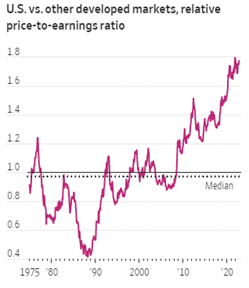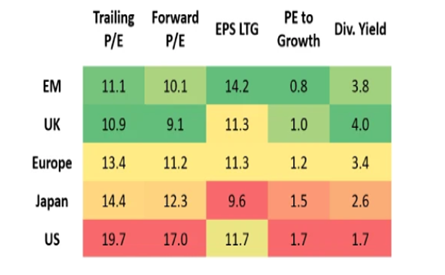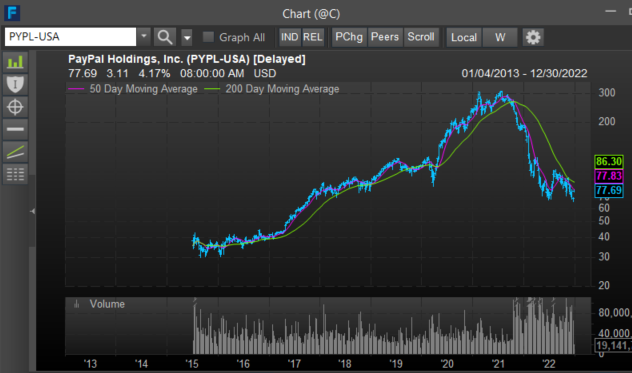8 ASX and global stock ideas to add to your watchlist this year
2022 was a most unusual year
Despite my children reminding me of how old I am, 2022 brought events that I have not witnessed in my lifetime. It was the third time since 1926 that both US stocks and bonds lost money. US inflation hit 40-year highs and the rest of the world was not far behind with Australia’s inflation spiking above 7% to levels not seen since the 1980s. This spike in inflation was driven by a culmination of factors including the continued impact of covid 19 on global supply chains, a war in Ukraine, and economic sanctions on Russia, which provides many parts of the world with much-needed energy and agricultural commodities.
The extremity of the economic sanctions caught most of the world off guard, including ourselves. Brent oil briefly traded as high as $140 per barrel. The ramifications of this heightened level of inflation have been rising interest rates, something the indebted world never thought would happen again.
The US Federal Reserve hiked interest rates by 4.25% and 30-year mortgage rates doubled to 7%, the highest level in over 20 years. Australia was impacted in a similar way and the Reserve Bank of Australia increased the cash rate from an all time low of 0.1% to 3.1% by December. Central banks around the world also unwound their loose monetary policy and hiked interest rates. The world of free money ended and so too did extreme valuations and asset bubbles started to pop.
As Alan Greenspan’s interest rate rises in 2000 popped the dot.com bubble, the rate rises in 2022 also burst many speculative asset bubbles. While the Nasdaq fell 33%, Morgan Stanley’s basket of unprofitable technology stocks fell 55%. Even profitable companies like Meta, Tesla and Netflix dropped over 60%.
Newly created asset classes like cryptocurrencies had drastic falls with Bitcoin falling 64% and companies like FTX, running Ponzi schemes, were exposed. If someone can explain to me how they value any of these cryptocurrencies, give me a call! Retail volumes started drying up as speculators started unwinding positions and I think we are still in the midst of that.
There were pockets of asset price appreciation this year with the US energy sector up 59%, following a 6.7% rise in WTI crude. The US dollar index (DXY) rose 7.9%, its best year since 2015. It was basically a one-way trade in currency markets with virtually every currency dropping against the US dollar. The Australian dollar declined 6.7% and the Japanese Yen declined 14% versus the US dollar despite staging strong last-quarter rallies. European currencies also moved at a similar rate to the Australian dollar.
In Europe, the war in Ukraine created a global surge in commodity prices in the first half of the year. Equity markets fell dramatically, and the Euro hit a 20 year low versus the US dollar. However, it was obvious after visiting Europe in September, that most of the major economies in Europe continued their daily lives and the economies proved resilient. The Euro stocks 600 staged a strong rally in the second half of the year and finished down 12.9%, better than the US’s S&P 500.
The focus in Asia this year was on China. The Chinese government seemed committed to their zero covid policy and this led to shutdowns in major cities like Shanghai. China’s diplomacy and seeming support for Russia also led to an exodus of western capital from Hong Kong and the Hang Seng hit all time low valuations of an index PE below 8x. At one point in late October, the Hang Seng was down circa 40% but the index staged a strong rally in November and December as China started unwinding its zero-COVID policy and the government stepped in to support the economy with policies like the setup of a $150 billion fund for its beleaguered property sector. The MSCI Asia index dramatically reduced its losses for the year and closed down 21.6%.
How to position in 2023
We expect Europe and emerging markets to outperform the US market in 2023 and this outperformance has already started in the past six months. Despite this year’s slump, U.S. stocks are nearly 1.8 times as expensive as the other 22 developed markets in aggregate, when comparing prices with corporate earnings over the past five years.
Shiller CAPE ratios show the MSCI Europe trading at 16.4 times inflation-adjusted average corporate earnings over the past 10 years, a steep discount to the S&P 500’s 28.4 P/E ratio. The MSCI Emerging Markets index is trading at 11.9 times earnings.


Our fund is positioned in companies that we believe have durable competitive advantages that will enable them to grow their earnings above GDP over the next decade. We look to invest in these companies at attractive valuations and don’t have a geographical bias.
Given we are searching for mispriced gems around the world, we have an even spread of investments around the world. 16.5% of our portfolio is in Australia, 21% in Asia, 18% in North America, 17.5% in Europe and 16% in Latin America. This is not by design, it is just where we are currently finding the best opportunities.
Our quality and value approach is skewing us to search around the world. This is quite different to buying an index that concentrates on the largest companies in each country. For instance, the MSCI world index is skewed towards the United States representing 70% of the index. When you are buying the MSCI world index, you are just buying large US technology companies with the largest weights to Apple, Microsoft, Amazon and Alphabet. You also are taking a large bet on the US dollar. We don’t think that is a great position to be taking when the US dollar is overvalued and those large capitalisation technology stocks are over-valued.
I have been investing in global markets for over twenty years now and I have always found that the best returns are generated when you marry together proven and incentivised management teams with companies that have a competitive advantage in their industry, have strong balance sheets and generate strong free cash flow.
We like to buy these businesses when the stock price is depressed due to analogous factors such as fear about a particular region, fear about a recession or simply more sellers than buyers. At the moment we are seeing a lot of these types of opportunities, and I will elaborate on one position in each geography. Given I wrote extensively about Europe in the last quarterly update, following my trip to the region, I will leave this continent out this time.
North America
We have started buying back into North America selectively in the past quarter as the large decline in the US stock market has provided us with the opportunity to buy back some of the high-quality companies that we owned five to ten years ago.
We bought a position in CME Group, the world’s leading derivatives exchange, allowing market participants to trade interest rates, equity indexes, foreign exchange, and a number of commodities. I owned CME Group for many years in the previous portfolio I managed at Perpetual and I am excited to be buying it again for our clients at Profeta. CME Group (NYSE: CME) operates in oligopolies with high barriers to entry and has consistently delivered circa 10% earnings per share growth per annum. The stock has fallen dramatically in the past year and is back to 2018 levels, so we are excited to be buying back into this quality franchise at an attractive valuation and a healthy 4% dividend yield.
Paypal (NASDAQ: PYPL)
We have also bought back into Paypal, an old favourite. Paypal’s stock price has had a rollercoaster ride over the past few years. It benefitted from the covid pandemic leading to a surge in eCommerce, which is a big driver of Paypal’s revenue. It also benefitted from a surge in technology stocks in 2021 following central bank stimulus and the retail stock market frenzy. Paypal’s stock peaked in the middle of 2021, along with the rest of the Nasdaq, at over $300. However, as e-commerce’s share of total retail sales normalised in 2022 and the technology bubble burst, its stock came crashing down. Online penetration of retail sales in the US increased from 18% in 2019 to 24% in 2020, at the height of the pandemic, and it has now normalised back down to around 22%. This is still 4% points above the pre-pandemic level and we expect it to continue to grow its share over the next decade.

We have been following Paypal ever since it was listed and actually owned the stock when it was listed as we were shareholders in eBay when it spun the company out in 2015. Paypal has been a tremendous success story ever since it was established by Peter Thiel and Max Levchin in 1998.
They developed an email payment product whereby anyone could log in to their website and transfer money. This company was initially called Confinity and in March 2000 it merged with Elon Musk’s X.com, which had a very similar product. The company was renamed Paypal in 2001 and listed in 2002. Shortly after listing, Paypal was acquired by eBay for $1.5 billion.
Under eBay’s ownership, the company became the prime digital wallet for eBay customers and their diverse spread of merchants. It went on to grow organically and acquire some of the leading players in the payments industry, such as Braintree and Venmo. The company which was acquired by eBay for $1.5 billion, was listed in 2015 at a market capitalisation of around $40 billion. At its 2021 peak, it was valued at over $300 billion and it is currently worth $86 billion.
Despite this extreme volatility in its market value, the business has consistently maintained and grown its share of the payments ecosystem. Since 2015 Paypal,s revenue has tripled to over $27 billion and its earnings per share have followed suit growing from $1.29 to circa $4 in 2022. However, its share price is now only double the 2015 level. It's easy to get caught up in the short-term noise of a share price but we are confident in the long-term direction that Dan Schulman, Paypal’s CEO since the IPO and John Donahoe, Paypal’s chairman and eBay’s former CEO, are taking the company in. They have successfully grown the company since it was part of eBay and we expect this success to continue.
Paypal has been at the cutting edge of the payments ecosystem for the past few decades. Its consumer brand trust helps improve checkout conversion for merchants and they are quick to provide new features for its customers. Paypal offers consumers the ability to use their digital wallets in an online or offline (at the store) environment. They also offer person-to-person payments, and consumer financial services and have quickly created a buy now pay later offer that has surpassed the usage of all its competitors.
Paypal has 432 million active accounts including 35 million active merchant accounts, which is a 4% increase from last year. Revenue growth is driven by this growth in active accounts, increasing retail spending and online’s increasing share of this retail spending pie, given the majority of Paypal’s volumes are online. Over the past 3 years revenue has grown at 16% p.a. and we expect it to continue to grow at double-digit rates.
Paypal’s wallet is accepted at 76% of the top 1500 US and European online retailers, well ahead of peer wallets Apple Pay (27%), Amazon Pay (15%), and Google Pay (13%). The launch of their super app in 2021, combining shopping, rewards, deals and payment has driven an improvement in customer engagement and the number of transactions per customer. Venmo, which started off as a person-to-person payment offering, has been one of Paypal’s strong growth drivers and we expect this to continue to be the case. Venmo has over 80 million active accounts, representing 30% of US adults and teens. Venmo launched on Amazon in November 2022 as a new payment option for select Amazon customers and is ramping up its availability on Amazon. Dan Schulman recently said that Venmo could be to Amazon what Paypal was to eBay. The other exciting recent initiative is Paypal’s partnership with Apple. Merchants will now be able to use their iPhone as a mobile point of sale when they link it to the Paypal or Venmo app. Apple pay will add Paypal’s debit or credit cards to their wallet, this will enable Paypal’s growth in the traditional brick-and-mortar, offline retail market.
An experienced and proven management team is important in growing a business. We find that you need to combine this with sound capital management to deliver consistent shareholder returns. John Donahoe and Dan Schulman have managed to deliver this for Paypal shareholders over the past decade. The company has a very strong balance sheet and they have been buying back $4 billion worth of stock over the past year, representing about 5% of its shares outstanding. We expect them to continue to buy back shares at this rate into 2023, if the stock price stays at these levels. With $5 billion of free cash flow generated each year and a proven management team, we are in safe hands and are excited about the company’s prospects.
Asia
As we mentioned in our previous few newsletters, we felt like we were a kid in a candy store, being able to buy high-quality companies at discounted prices in Asia recently. This has proven to be correct and many of these positions have rallied back quickly and continue to rise in January.
We expect these companies to do very well over the next decade and have focused on owner-managed businesses, which are leaders in their respective industries. Baidu was one of our best performing stocks this year and I have added a snippet about their Apollo robotaxis in this newsletter. We are excited about what Robin Li and the team are building there. We have also recently bought into Taiwan Semiconductor Manufacturing Company, one of the world’s leading semiconductor chip manufacturers. Like Paypal, I have invested in TSMC in the past and the recent sell-off in technology stocks has provided us with an attractive entry point into this technology leader. Bloomberry Resorts has been a quiet achiever in our portfolio this year and I would like to discuss this company in a little more detail.
Bloomberry Resorts (PSE: BLOOM)

Bloomberry Resorts is the leading integrated resort in the Philippines and one of four private entities that were granted a casino licence in the Philippines. Its main property is Solaire Resort and Casino in Manila, which was opened in 2013.
As of November 2022, Solaire had a 45% market share of gross gaming revenue in Manila compared to Okada and City of Dreams with 21% and 16% share respectively. Bloomberry is run by Enrique Razon, the third wealthiest person in the Philippines. He is the Chairman and Chief Executive Officer, owning 65% of the group.
We have been following the company for over a decade and have been impressed by the quality of the company’s assets and its ability to weather the covid 19 pandemic. Prior to the pandemic, Asia was the fastest-growing gaming market and we expect it to regain this mantle once Chinese gamblers start travelling again, which is imminent. Prior to the pandemic, 45% of Bloomberry’s revenue was generated from Chinese players, mainly VIP revenue. Mass gaming revenue has seen a strong recovery in 2022 allowing the company to achieve profitability again in 2022, much earlier than other Asian gaming regions like Macau. In November, Chinese visitors started returning and gross gaming revenue finally surpassed pre-pandemic levels for the first time, hitting an all-time record.
The recovery is well on its way and Solaire increased its market share by 10% points in November, reflecting the high-quality nature of its offering. Their new casino, Solaire North, is expected to open sometime at the end of 2023, and the timing could not be better. It will also be in metropolitan Manila, 20 kilometres north, in Quezon City. They are the only operator capable of building a second site and we expect this second property to drive the company’s earnings growth for the next decade.
We have been looking for ways to get exposure to a recovering Asian consumer, post the impact of covid 19. Bloomberry provides us with this as well as exposure to the growing wealth in Asia. The stock has appreciated 35% since our initial entry in 2022, but it would need to appreciate another 50% to get back to its 2018 highs. At a mere 8x Enterprise Value over EBITDA, it is still one of the cheapest casino operators in the world and we continue to be happy holders.
Baidu (HKG: 9888)

Baidu Inc. unveiled a new version of its self-driving robotaxi that it says costs nearly half as much to make as the previous model, opening the opportunity for cheaper travel. Apollo RT6 robotaxis are set to be mass-produced at a cost of 250,000 yuan ($37,000) per unit. The car, which has a detachable steering wheel, will become available on Baidu’s riding-hailing service in 2023. The company said it plans to eventually deploy “tens of thousands” of the robotaxis. “We are moving toward a future where taking a robotaxi will be half the cost of taking a taxi today,” Baidu co-founder and Chief Executive Officer Robin Li said in the statement.
Latin America
We have written in previous newsletters about AFYA, the leading medical university operator and health technology provider in Brazil, and Pagseguro, a leading merchant acquirer and digital bank in Brazil. We are excited about these positions and will be visiting these companies in March.
I would like to mention one of our positions in Mexico in this newsletter, Bolsa Mexicana. I have invested in stock and asset exchanges for a number of decades now and they have generated strong returns over this period. In 2010, I invested in the Nasdaq stock exchange and enjoyed the stock rise ten-fold over a decade. Around the same time, I also invested in the CME Group, and as I mentioned we re-entered that position for Profeta clients recently. The increase in Nasdaq’s share price by 10x over a decade was due to the cheap valuation we bought into the company and its consistent earnings growth over that period.
Stock exchanges are wonderful businesses because of the monopolies or oligopolies they operate in, the natural increase in value of asset prices over time and the strong free cash flow that these businesses generate. Over the past five years, Bolsa Mexican has grown its earnings at a similar rate to Nasdaq at 10% per annum, yet its current price-to-earnings ratio is only 13x, compared to 23x for Nasdaq. When I first bought into Nasdaq it was trading on a PE of 8x, so the increase in the valuation alone lead to the stock tripling.
Bolsa Mexicana (BMV: BOLSAA)
Bolsa Mexicana is a fully integrated exchange group in Mexico that operates cash, listed derivatives and over-the-counter markets for multiple asset classes including equities, fixed income and ETFs. It also provides custody, clearing and settlement facilities. It is the second-largest stock exchange in Latin America. It was established in 1895 by a group of brokers including Francisco Llerena and Luis Neocoechea. While everyone loves to buy a dream idea with the hope that it will be the next flashy new technology, we are often happy to buy companies that have been around for centuries that have proven their worth. Over the decades a number of new stock exchanges were established in Monterrey and Guadalajara in Mexico and in 1975 they were consolidated into one single stock exchange and named Mexico Stock Exchange (BMV). Over the years the exchange became electronic and added asset classes such as options. The company continues to be the leading exchange in Mexico today with over 80% share in equities trading and is the sole central securities depository in Mexico, providing settlements, clearing and custody services.
The company is led by its Chairman, Marco Martinez, a forty-year veteran of Mexico’s financial services industry, having run Santander’s Mexican business for many years. Jose Oriol Bosch Par has been the Chief Executive Officer since 2015 and has done a tremendous job of more than doubling the group’s earnings over that period.
Despite weak equity trading volumes in most equity markets around the world, Bolsa Mexicana managed to generate 6% revenue growth and 9% net income growth in the last quarter as growth in their derivatives business and over the counter business offset weakness in equities. Good cost control at the group also means that the company is expected to continue to grow its earnings in 2022 and 2023.
Despite growing its earnings handsomely over the past five years the stock price has only appreciated slightly, with the earnings multiple falling from a peak of 28x in 2013 to the current 13x. We expect that over time this multiple will rise and drive some good stock price performance. In the meantime, we are happy to sit and wait and collect a 6% dividend yield.
Australia
Our positions in Australia focus on owner-managed businesses that are small and growing, either winning market share in Australia or growing into international markets. These positions include Betmakers (ASX: BET), Dicker Data (ASX: DDR), Noble Oak Life (ASX: NOL) and Smartpay (ASX: SMP). We have also invested in Woodside Energy (ASX: WDS), which offers us exposure to high-quality oil and gas assets.
6% of our portfolio assets are invested in unlisted companies which are emerging companies domiciled in Australia. These include Boost Lab and Ultracommerce. We expect these businesses to continue to win market share in their respective industries and list on a stock exchange in the coming years.
We focus on companies that have strong competitive advantages that are growing both domestically and in international markets. We have recently invested in Fluentdocs, which has two subsidiaries, Rulestar and Smarterdrafter.
Fluentdocs
Fluentdocs is one of the many businesses I have watched grow since day one. I was listening to an interview with Elon Musk the other day and he said that starting a business is like eating glass and staring into the abyss. For those of us who have started businesses, we can understand how hard it is to start a business and get through those early years. I studied commerce and law with the founders, David Lipworth and Ben Rosswick and have a high degree of respect for their level of intellect and capability. I watched David Lipworth grow the business from nothing to around $1 million in software as a service revenue.
This is no small feat and I am excited to have the opportunity to invest in the business for Profeta at a time when the business is launching into new industry verticals and expanding into international markets this year. While a lot of small unlisted start-ups burn a lot of capital, Fluentdocs was actually profitable last year and we managed to buy into the company at an attractive valuation.
Fluentdocs’ core product is Smarter Drafter, a document automation tool used to automate a large range of sophisticated legal documents. Smarterdrafter focuses on selling its tools to legal firms, to enable them to improve their efficiency and productivity. They have signed up more than 1000 lawyers across Australia and are building out the business domestically with new tools and solutions.
Over the past few years, the team have invested heavily in research and development, broadening out the automation capability of their technology to enable companies in other industries such as the financial services industry to automate reports, advice and other related documents. The company launched a new subsidiary called Rulestar last year to focus on this expansion and a new team of investors including Profeta have invested to help grow the offering both domestically and offshore. We are excited to see new investors come on board including the founders of Avoka Technologies, which sold to Temenos for A$339m and grew an Australian software company into the US financial services market.
1 topic
7 stocks mentioned

